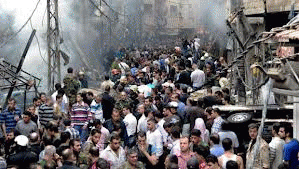Amid an escalating drumbeat about a supposed threat that Syria's government is preparing to use chemical weapons against its own people, Washington has deployed a naval armada off the country's coast.
The USS Eisenhower carrier strike group was sent through the Suez Canal from its deployment in the Persian Gulf earlier this week and has reportedly arrived in the Mediterranean near Syrian shores. The deployment joins that of an amphibious battle group already present in the eastern Mediterranean, consisting of the USS Iwo Jima, the USS New York and the USS Gunston Hall, which together carry a contingent of 2,500 US Marines.
Between the two naval forces, Washington now has 17 warships, 70 fighter-bombers and 10,000 military personnel within close striking distance of Syria. This is in addition to the Air Force's 39th Air Base Wing stationed at the Incirlik base in Turkey together with tens of thousands of US ground troops deployed in Kuwait, Qatar, the United Arab Emirates and Bahrain.
Citing US military sources, the Times of London reported Wednesday that Washington is ready to launch a military attack on Syria "within days."
"It won't require major movement to make action happen," an unnamed US official told the British newspaper. "The muscle is already there to be flexed."
Pentagon sources have suggested that an intervention carried out on the pretext of securing Syria's chemical weapons would require some 75,000 troops.
In a further threat of direct US-NATO intervention, NATO governments are moving ahead to implement Tuesday's decision of the NATO foreign ministers conference to deploy Patriot missile batteries on Turkey's border with Syria. Germany's defense and foreign ministers announced a decision to deploy some 400 German troops on the border. Similar detachments will also be sent by the US and the Netherlands.
While Turkey claimed it needed the missiles to defend itself from a supposed threat that Syria would fire missiles carrying chemical weapons towards its border, the Patriot batteries could also be used to impose a de facto "no-fly zone" over northern Syria, allowing the US-backed "rebels" to consolidate control over territory and creating the conditions for the installation of a Western-backed government on Syrian soil.
US officials have reiterated threats made by President Barack Obama and others in the administration about the government of President Bashar al-Assad crossing a "red line" and facing military action if it uses chemical weapons.
Defense Secretary Leon Panetta Thursday described the US administration as "very concerned that as the opposition advances, in particular on Damascus, that the regime might very well consider the use of chemical weapons."
Panetta referred to unspecified intelligence as the cause of these supposed concerns. Media outlets like the New York Times, CNN and NBC News have trumpeted this "intelligence," citing unnamed US officials as the sources for vague and often contradictory accounts of developments that have allegedly pointed toward a potential use of chemical weapons in Syria.
Syria's deputy foreign minister, Faisal Maqdad, charged Thursday that the allegation made by the US and other NATO countries about Syria's chemical weapons were designed to create a "pretext for any subsequent interventions."
"Syria stresses again, for the tenth, the hundredth time, that if we had such weapons, they would not be used against its people," said Maqdad in an interview with Lebanon's Al Manar television.
Speaking at the NATO foreign ministers meeting in Brussels, Russian Foreign Minister Sergei Lavrov accused Washington and its allies of manufacturing the alleged chemical weapons threat.
"As soon as we get these rumors [about chemical weapons] we engage in constructive demarche; when we get confirmation that nothing of that type is happening we share this information with our American colleagues," Lavrov told the media.
(Note: You can view every article as one long page if you sign up as an Advocate Member, or higher).





